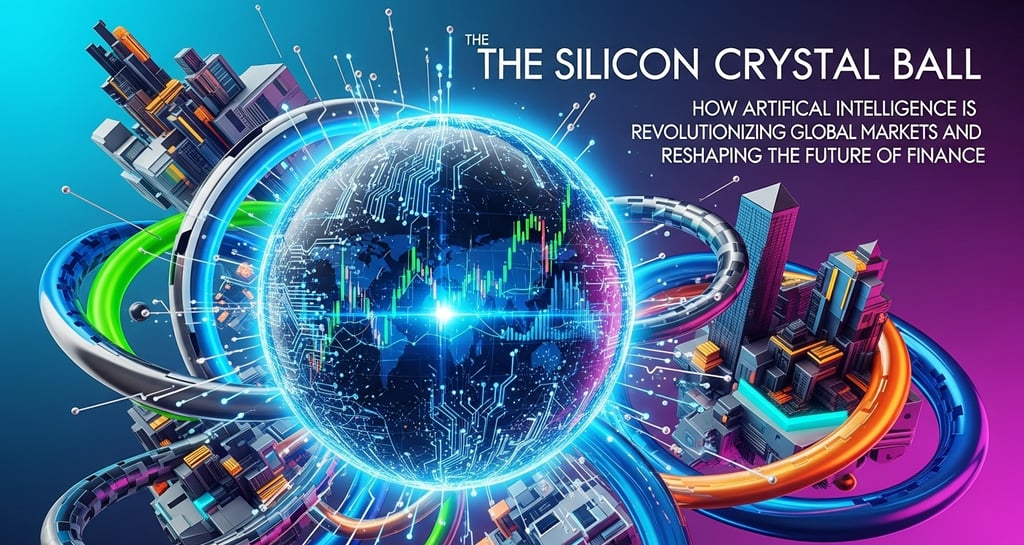The Silicon Crystal Ball: How Artificial Intelligence is Revolutionizing Global Markets and Reshaping the Future of Finance
Think you wake up on a Monday morning, grab your coffee, and check your investment portfolio. While you were sleeping, an AI system analyzed thousands of news articles, processed satellite images of factory parking lots, and even monitored social media chatter to make investment decisions on your behalf. This isn't science fiction it's happening right now in financial markets around the world.
ARTIFICIAL INTELLIGENCEFINANCETECHNOLOGYSTOCK MARKET
Hitanshu Soni
7/23/20254 min read


From Chaos to Code: The Great Trading Floor Transformation
Remember those old movies with traders shouting and waving papers frantically? Those days feel like ancient history. Now, a modern trading center, and the contrast was striking rows of quiet computers humming away, making millions of trades per second. It's almost eerie how calm it looks while billions of dollars change hands through algorithmic decisions.
These AI trading systems don't just work faster than us humans they're genuinely smarter at spotting patterns we'd never notice. Think about it: while you're analyzing one company's earnings report over your morning coffee, these algorithms are simultaneously processing thousands of reports, news stories, and even tweets to make trading decisions. It's like having a super-intelligent friend who never sleeps and can read everything on the internet in seconds.
The New Sherlock Holmes: AI Detective Work in Finance
What really fascinates me is how AI has become like a financial detective. These systems can read between the lines of CEO interviews, pick up on subtle changes in company language, and even analyze the tone of quarterly earnings calls. I've heard stories of algorithms that correctly predicted company troubles just by noticing changes in how executives spoke during conference calls subtle shifts that human analysts missed completely.
One hedge fund manager told me their AI system once flagged a retail company for potential problems after analyzing satellite images showing empty parking lots at their stores. While traditional analysts were still poring over financial statements, the AI had already spotted the real-world warning signs from space. It's like having x-ray vision for the market.
Your Personal Financial Advisor Lives in Your Phone
Here's what excites me most: AI is putting sophisticated investment tools into everyone's hands. Your grandmother can now access the same kind of portfolio management that billionaires use, all through a simple app on her smartphone. These robo-advisors work like having a tireless financial advisor who monitors your investments 24/7, automatically adjusting your portfolio when markets shift.
I've watched friends who were intimidated by investing become confident traders using AI-powered apps that explain market movements in plain English and suggest personalized investment strategies. It's democratizing finance in a way we've never seen before suddenly, you don't need to be wealthy or work on Wall Street to access institutional-quality investment tools.
When Machines Talk to Machines: The New Market Reality
The really mind-bending part is that most stock market activity now happens between machines talking to other machines. Imagine a conversation happening millions of times per second, where AI systems are constantly negotiating prices, assessing risks, and making trades without any human involvement. It's like a massive digital marketplace where robots are the primary shoppers and sellers.
This machine-to-machine trading has made markets more efficient in many ways. Spreads are tighter, transactions happen faster, and there's more liquidity. But it's also created this strange new world where market movements can happen so quickly that by the time humans notice, the AI systems have already moved on to the next opportunity.
The Dark Side: When Smart Machines Go Wrong
Of course, it's not all sunshine and profits. I'll be honest there's something unsettling about flash crashes where billions in value can disappear in milliseconds because algorithms started talking to each other in unexpected ways. It's like watching a conversation between super-intelligent beings that suddenly goes haywire, taking everyone's retirement savings along for the ride.
I worry about what happens when a handful of tech companies control most of the AI systems running our financial markets. It reminds me of those dystopian movies where a few powerful entities control everything except this is real, and it's happening with our money. The concentration of this much market power in so few hands feels risky.
Then there's the privacy question that keeps me up at night. These AI systems know everything about our spending habits, investment patterns, and financial behavior. They're building incredibly detailed profiles of who we are and what we might do next. It's convenient, but also a bit creepy when you think about it.
Peering Into the Crystal Ball: What's Coming Next
The future looks even more extraordinary. Quantum computers could eventually make today's AI systems look like pocket calculators. Imagine algorithms that can simulate entire economies in real-time or predict market movements with unprecedented accuracy. We might see fully automated trading systems that never need human intervention, making decisions based on data sources we haven't even imagined yet.
I've heard whispers about AI systems that could eventually manage entire national economies, automatically adjusting interest rates and money supply based on real-time economic data. It sounds like something from a sci-fi novel, but given how quickly things are moving, it might not be as far-fetched as it seems.
What This Means for You and Me
As someone who's watched this transformation unfold, I think the key is finding the sweet spot between embracing these powerful tools and maintaining our human perspective. The most successful investors I know aren't trying to compete with AI they're learning to work with it.
These systems are incredibly good at processing information and identifying patterns, but they still struggle with the messy, emotional, irrational side of human behavior that ultimately drives markets. That's where we still have an edge. Our intuition, creativity, and ability to think outside the box remain valuable in a world increasingly dominated by algorithms.
Navigating This Brave New World
Standing at this crossroads between human intuition and artificial intelligence, I'm both excited and cautious about what's ahead. The potential for more efficient, accessible, and intelligent financial markets is enormous. Imagine a world where everyone has access to sophisticated investment tools, where markets are fairer and more transparent, and where technology helps us make better financial decisions.
But we can't forget that behind all these algorithms and systems, there are real people with real financial dreams and fears. The challenge isn't just building smarter machines it's ensuring these powerful tools serve humanity rather than the other way around.
The silicon crystal ball may be getting clearer, but we're still the ones who need to decide what to do with the visions it shows us. In the end, the future of finance will be shaped not just by how smart we can make our machines, but by how wisely we choose to use them.


Hitanshu Soni
Software Developer Engineer at SportVot
